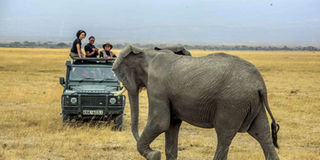Let’s all partner in war against poaching

First Lady Margaret Kenyatta (right), watching elephants in Amboseli National Park when she took her anti poaching campaign 'Hands off our elephants" to the park in the past. PHOTO | PSCU
What you need to know:
Serious consequences are spelt out for engaging in illegal wildlife trade, such as life imprisonment and hefty fines.
The threat of poaching to our environment and wildlife heritage is not in doubt.
Wildlife plays a major role in Kenya’s economy. As a major tourist attraction, it accounts for some 12 per cent of gross domestic product (GDP) and provides over 300,000 jobs.
Unfortunately, reports of illegal trade of endangered wildlife trophies intercepted while on transit are common, with the Mombasa port identified as a key conduit. That is often blamed on factors such as corruption and lack of stringent monitoring systems at key border points.
The Wildlife Conservation and Management Act 2013 was aimed at improving the protection, conservation, sustainable use and management of Kenya’s wildlife resources. It imposes the highest penalties in the continent — if not the world — to those who threaten wildlife, especially the endangered species.
Serious consequences are spelt out for engaging in illegal wildlife trade, such as life imprisonment and hefty fines.
HINDER TRADE
This law was seen as one that would hinder this trade.
The threat of poaching to our environment and wildlife heritage is not in doubt. However, the war against it needs to be fought through a combined stakeholder effort involving law enforcers, public sensitisers and intermediaries who may be voluntary or involuntary conduits.
The illegal traders are getting more creative and discreet. It is yet to be seen that a contraband trader declares a shipment as “elephant tusks” on the bill of lading or air way bill and not “African artefacts”, “jewellery” or “vegetables” and other perishable products.
To the simple untrained eye, that shipment will, no doubt, be taken through the logistics rigours professionally and exported as declared — unless it is screened at the port of exit or entry and flagged for a mismatch of the declaration and the shipment or intercepted at the destination port and declared as contraband.
GRAND OPPORTUNITY
However, therein lies the grand opportunity.
Global logistics bodies have made it mandatory for industry players to ensure their workforce attends certain mandatory courses along handling of explosives or dangerous goods, perishables and other items. They also insist that a certain ratio of a firm’s staff must undergo annual refresher courses for it to maintain its global status.
The wildlife associations should engage the logistics companies to ensure that their staff undergo a certain level of training to enable them to be alert to and aware of suspicious shipments that could be illicit game trophies.
Unfortunately, that critical role has been left to wildlife regulators and organisations that do not handle or monitor shipments in real time.
SENSITISATION
The main representative of wildlife associations is, largely, the regulatory arms of government, whose role is more of enforcement than sensitisation.
And there is where a gap is.
Any logistics entity is set up with a long-term plan to generate business and profit by delivering professional cargo services within the law.
Logistics players in Kenya are frustrated by illegal traders, who have soiled the industry’s good name by cunningly using their services as conduits.
TRAFFICKING
Many logistics firms are unwillingly facilitating game trafficking and painfully paying the price through not only loss of business but also their hard-earned reputation. Logistics players are often fingered erroneously by, particularly, wildlife stakeholders as co-conspirators in illegal trade, rather than as victims.
Let us develop solutions and programmes to stop game trafficking by using available frameworks with a view to making it unattractive to use Kenya as an illegal transit point. Kenya is, after all, East Africa’s business hub and this position must be protected at all costs.
Ms Nduta is group marketing and communications manager, Siginon Group. [email protected]





